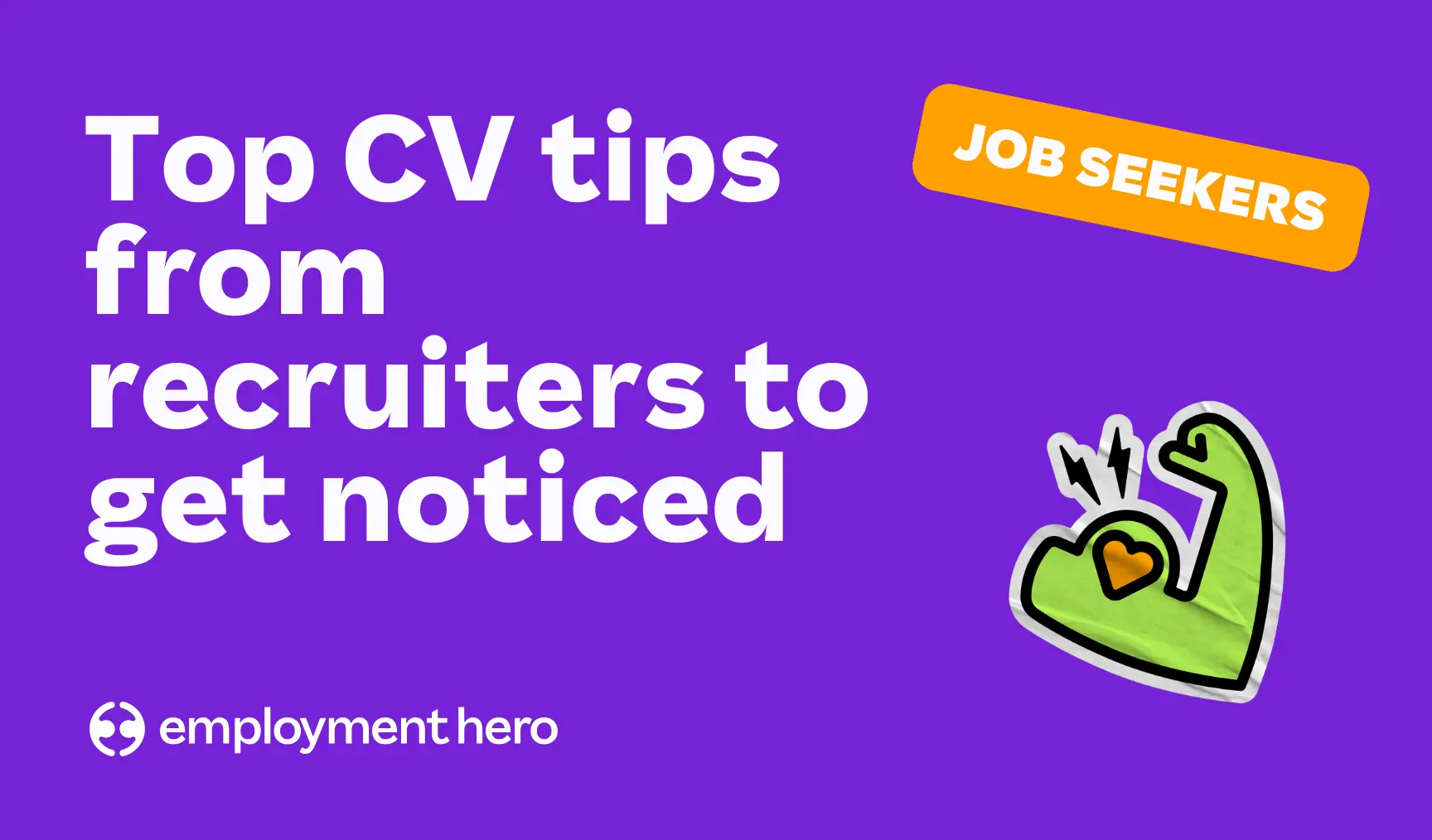Top CV dos and don’ts according to recruiters
Whether you’re just starting your career, switching industries, or looking for a fresh start, this guide will help you craft a CV that aligns with exactly what recruiters are looking for.

Contents
A standout CV can be your golden ticket to securing interviews and landing the perfect job. Recruiters often spend only seconds scanning through CVs, so it’s crucial to get it right. Whether you’re just starting your career, switching industries, or looking for a fresh start, this guide will help you craft a CV that aligns with exactly what recruiters are looking for.
Why your CV matters
Your CV is more than just a list of what you’ve done, it’s your personal brand. It tells potential employers why you’re the ideal candidate for the role. With intense competition across industries, a strong CV can make all the difference. Here’s what sets the New Zealand job market apart and what recruiters expect from applications:
- Less is more: Keep your CV concise; two pages should be enough to convey your suitability without overwhelming your reader.
Highlighting successes: Reflect on the outcomes and impact you’ve had throughout your experience, rather than simply listing what you did in the role.

Work experience: what to include and avoid
The work experience section is where you get to showcase your career achievements and highlights. Presented well, it can make you a standout candidate.
Do
- Prioritise relevance: List your most recent roles and highlight experience directly related to the position you’re applying for.
- Be results-focused: Use bullet points to outline your achievements. Start each point with an action verb, such as “increased,” “developed,” or “implemented,” and focus on measurable outcomes.
- Tailor to the job: Match your experience to the job description by emphasising skills and accomplishments relevant to the role.
Good example: “Reduced client churn by 25% by implementing a customer retention program.”
Poor example: “Was responsible for customer success tasks.”
Don’t
- Don’t exaggerate achievements: Be honest about your responsibilities and results. Trust is critical when applying for jobs, and transparency is key to gaining it.
- Don’t include unrelated details: If a previous job or task isn’t relevant to the role, leave it out, or at least don’t make it the main focus on your CV. If you’re applying for an admin role, for example, don’t lead with your experience in landscaping: keep it relevant.

How to demonstrate hard skills
Hard skills or technical skills demonstrate your qualifications for the job, but presenting these effectively can set your application apart.
How to demonstrate hard skills
- Industry-specific skills: Tailor your CV to highlight skills specifically required in the job listing. These will differ depending on the role, but could include everything from data analysis, barista certifications, technical writing, software development, and others.
- Organise logically: Create groupings like “Technical Skills” or “Software Proficiencies” for better clarity.
- Add context: Rather than listing “Excel,” specify “Proficient in Excel, including PivotTables and automation macros.”
Common mistakes
- Avoid buzzwords or jargon overload: Words like “synergies” or “disruption” lack clarity. Instead, use quantifiable achievements to demonstrate your capabilities.
- Neglecting ATS compatibility: Overly formatted content such as graphics can make skills invisible to tools hiring managers use to track applications, like Applicant Tracking Systems (ATS). That can be the difference between your application progressing, or not, so check if the ad asks for a specific file type before submitting.

Soft skills Kiwi employers want (and what to skip)
Soft skills showcase your ability to adapt and thrive in a work environment. Here’s how to incorporate them effectively.
Demonstrating soft skills
- Show, don’t tell: Instead of stating “Excellent communicator,” provide examples like “In X role, I led weekly client meetings to improve project timelines and relationships.”
- Leverage the STAR technique: Use the STAR method (Situation, Task, Action, Result) to add depth to the examples you provide For example, “In X role, I worked to resolve a workplace conflict (Situation) by improving communication between myself and my colleague, (Task), leading to a 30% increase in work output (Result).”
- Focus on key qualities: Kiwi employers value adaptability, teamwork, initiative and work ethic.
What to skip
- Generic claims: Avoid vague statements like “hard worker” unless they’re backed up with examples.
- Soft skills lists: Bulleted lists with terms like “team player” or “problem-solver” can feel hollow without proper context.

Volunteer experience: What counts and what doesn’t
Volunteer work can enhance your CV by emphasising skills or showcasing your own values and motivators.
- Include relevant contributions: Experience managing charitable events or initiatives is valuable, especially for first-time job seekers or those changing careers.
- Include key project achievements: Highlight quantifiable impacts like “In X volunteer role, I raised $15,000 for local schools through event coordination.”
- Skip unrelated roles: Avoid including voluntary work that doesn’t directly relate to the job application at hand.
- Skip overloading details: Short-term projects or minor roles should be omitted unless they clearly reflect relevant skills.

Education and certifications: What NZ employers look for
Education adds credibility to your CV but needs to be presented in a way that demonstrates relevance and impact.
Must-have details
- Specific qualifications: Include NZQA-recognised certifications or qualifications tailored to the role, such as diplomas or training certifications.
- Professional credentials: Highlight courses or certifications that add unique expertise.
What not to include
- High school details: Unless it’s your only qualification and you’re just starting out in the workforce, leave out details of your high school education.
- Unfinished degrees: Mention this only if they demonstrate what skills you could bring to the role, such as “I’m currently completing a Diploma in Digital Marketing, which will help me deliver X tasks in this role.”

Formatting tips for a stand out CV
Recruiters want resumes that look good and are easy to use. To make sure your resume does this, remember these tips.
What to do:
- Use simple fonts like Arial or Calibri to make it easy to read.
- Save your resume as a PDF so it works on any device.
- Make sure your resume is easy for computer programs (ATS software) to read by avoiding too many visuals or complicated designs.
What not to do:
- Don’t use too many colors or fancy templates that can take attention away from what you’ve written. Focus on the content of your CV.
- Also, remember that many recruiters look at CVs on their phones, so make sure yours looks good on a mobile device as well as desktop.

Cover letters: When they matter and what to say
Never underestimate the power of a solid cover letter. Here’s how to make yours stand out to Kiwi employers:
What to address
- Why this job: Personalise each letter to show your enthusiasm and understanding of the role.
- What you bring: Share specific examples of how your skills align with the company’s needs.
- Keep it professional: Maintain a formal yet engaging tone.
What not to include
- Generic statements: Phrases like “I’m a hard worker” don’t add value without examples.
- Excess length: 1-2 pages is all you need.

Kickstart your job search with Employment Hero Jobs
When job hunting gets competitive, tools like EH Jobs offer immediate CV building and personalisation based on local best practices. Save time while creating a standout application. Start your successful job search with Employment Hero Jobs today.
Frequently Asked Questions
When putting together your CV, it’s best to highlight your work experience from the past 10 years. You should also include any roles that are directly related to the job you’re applying for, even if they were more than 10 years ago. This helps recruiters see your most relevant and recent skills.
When creating a CV, you don’t need to list your references directly. Instead, you can simply state “References available on request” at the end. This saves space on your CV while still letting employers know that you have references ready if they ask for them.
Using a PDF format for your CV means that your document will always look the way you designed it, no matter what kind of device or software the person viewing it uses. This ensures all your careful formatting and design choices are kept intact.
It’s a good idea to send a cover letter, especially if the job advertisement asks for one. Even if it’s not specifically requested, sending a cover letter can help you stand out from other applicants.
Related Resources
-
 Read more: Candidate engagement: Strategies to improve your hiring process
Read more: Candidate engagement: Strategies to improve your hiring processCandidate engagement: Strategies to improve your hiring process
Learn how businesses can build a positive candidate engagement experience.
-
 Read more: Building a strong talent pipeline: Strategies for recruiting and developing future leaders
Read more: Building a strong talent pipeline: Strategies for recruiting and developing future leadersBuilding a strong talent pipeline: Strategies for recruiting and developing future leaders
Learn how to recruit, develop, and retain quality employees who can become future leaders.
-
 Read more: 13 Creative Talent Sourcing Strategies to Expand your Talent Pool
Read more: 13 Creative Talent Sourcing Strategies to Expand your Talent Pool13 Creative Talent Sourcing Strategies to Expand your Talent Pool
Recruitment favours the proactive. Here’s how to refresh your talent sourcing strategy for 2023.





















